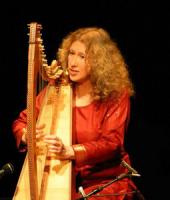 Veronique Chalot è nata in Normandia, nel nord della Francia.
Veronique Chalot è nata in Normandia, nel nord della Francia.
E' a Ronen e poi a Parigi che comincia ad interessarsi e a suonare la musica popolare francese. Nel 1974 approda in Italia, ed esattamente al Folkstudio di Roma trova ampi consensi tanto da registrare dal vivo un L.P. per la nuova etichetta, fondata dal noto locale romano proprio in quei giorni.
Veronique vive ormai da anni lunghi periodi in Italia e si è stabilita a Firenze, non solo come abitazione, ma anche come situazioni in cui impegnarsi nei contatti con l'associazionismo democratico, nelle esperienze di base, nel rapporto continuo con il territorio.
**
"Veronique Chalot was born in Normandy in the north of France, but it was in Paris that she first became interested in traditional French folk music. In 1974 she landed in Rome where she soon earned a small, but dedicated following. In 1979 she recorded her first studio effort, J'ai vu le loup, for the Italian Materiali Sonori label. Over the past 30+ years she has given hundreds of concerts, presenting her repertoire of traditional French/Italian folk songs and building awareness of that fascinating patrimony of antique melodies and dance rhythms. Since 2005 she has played with Veziana, an ensemble dedicated to early music from both sides of the Pyrenees."
"England may have its Jacqui McShee (Pentangle), but France and Italy have its Veronique Chalot. For the past three decades Veronique has dedicated herself to playing, recording and researching medieval, renaissance, and early folk music from France and Italy, helping to save these musical forms from total obscurity. A l'entree du temps clair, released in 1982 on the small Italian Materiali Sonori label, was recorded while Veronique was living and researching in Italy. Although it was only her second studio album, Veronique's immense talent and sensitivity was already extremely evident. Here she sings and plays classical guitar (as well as the dulcimer and the hurdy-gurdy), backed by five Italian musicians playing a number of traditional instruments, including bouzouki, bagpipes, crumhorn, bendhir and bodhran, making this album of early French traditional music an enjoyable discovery even nearly three decades after its release."
Forced Exposure